|
FAQs about Marine Snail
Identification 21
Related Articles: Gastropods, Sea Slugs, Mollusks, Abalone,
Related FAQs: Snail ID
1, Snail ID 2, Snail ID 3, Snail
ID 4, Snail ID 5, Snail ID 6, Snail
ID 7, Snail ID 8, Snail ID 9, Snail ID
10, Snail ID 11, Snail ID 12, Snail
ID 13, Snail ID 14, Snail ID 15, Snail ID
16, Snail ID 17, Snail ID 18, Snail ID
19, Snail ID 20, Snail ID 22, Snail
ID 23, Snail ID 24, Snail ID 25, Snail
ID 26, & Marine Snails
1, Marine Snails
2, Marine Snails 3,
Invertebrate ID, Snail Behavior, Snail Selection, Snail Compatibility, Snail Systems, Snail Feeding, Snail Disease, Snail Reproduction, Mollusks, Sea
Slugs, Abalone,
|
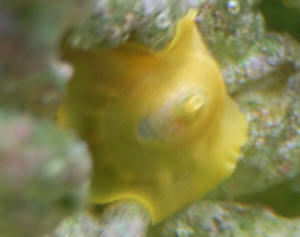
|
|
ID for Snail in Dailies - 10/05/2009
Hi Bob,
<Amazing Lynn>
The snail in the photo today looks like something in the genus
Babylonia, which depending on where you look, is usually either
assigned to the family Babyloniidae, or Buccinidae. Here's an
example of one:
http://www.gastropods.com/1/Shell_11.shtml
Main page with others in this family:
http://www.gastropods.com/Taxon_pages/TN_Family_BABYLONIIDAE.shtml
<Ahh, Babylonia zeylanica... does look like this>
Do you have any other photos of this little guy?
<I do not>
If so, and if you can tell me where it's from, I should be
able to narrow it down further.
<... a fish store>
Take care,
-Lynn
<Thank you dear. BobF>
snail ID - 10/05/2009
Hi everyone,
the snail in today's pic of the day is a Buccinulum corneum
as far as I can see. They live in the sand, are predatory and are
sometimes used for controlling bristle worms.
Alex
<Ahh! Thank you Alex. Bob Fenner>
Re: snail ID
Bob,
I just took a second look - it might as well be some Babylonia
species (also from the Buccinidae family). They do look pretty
much alike as far as siphons etc. go. A good reference is
http://www.nmr-pics.nl/Buccinidae/album/index.html
in this regard.
Alex
<Yes... my best guess is Babylonia zeylanica.
BobF>
|
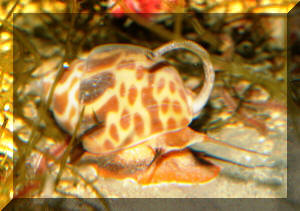 |
Re: ID for Snail in Dailies -
10/05/2009
Right back at you, Amazing Bob!
<Heeee!>
You're most welcome. Those are neat-looking little snails, but
I wouldn't trust them around other Molluscs. They're
predators and scavengers. Also, I didn't mention in the
previous mail, but the common name is Babylon or Babylonia snail
and I've seen them available from time to time on the 'net
and locally. Woe be it, though, to the person who puts one in their
tank without knowing the possible consequences!
Take care,
-Lynn
<Be chatting! BobF> |
|
Please Help with an ID: Strombid - Conch
10/5/09
Dear Crew,
<Hello Justin, Lynn here today.>
A few months ago we were at a new LFS in our area. My wife has a
fascination with conchs, and when she saw these really
interesting spiny shelled "conchs", she just had to
have one. The only problem was, this particular "conch"
as we were sold was a murex snail.
<Oops, Murex can have exquisitely beautiful, ornate shells,
but they're predators.>
Well after a few months, we finally saw the snail feeding on our
fighting conch.
<Ouch>
It was too late for him, and we proceeded to remove the snail to
a 5g tank by himself (my wife couldn't bring herself to get
rid of it).
<Good for her!>
Anyway I got in contact with the LFS, and they did in fact
apologize and offer to replace our conch for their mistake.
<Wow, that's a well-run store.>
Apparently these snails were labeled as "conchs" when
they came in. Anyway we went back yesterday to get a replacement
conch, and we got some kind of what I believe to be a snail that
they said was a conch, and promised it was. Now I am no conch
expert, but to me, this really doesn't look like any conch I
have seen available in the trade.
<There are many varieties and appearance can vary quite a bit
within a given species.>
I was hoping if I could get some help, since I have already had
one predatory snail, I don't really care to have another.
<I can certainly understand that. From what I can see, you do
indeed have another conch -- something within the family
Strombidae ('true' conchs). Unfortunately, given the
number of possibilities, and not knowing the location of origin,
I can't narrow it down any further. My guess is that it's
probably one of the Florida or West Indies species, but again,
with the degree of variation in color, presence/shape/size of
spines/knobs, etc., it's hard to pin down which. It also
appears that your poor little snail received some rough
treatment/wear at some point, whether (naturally) in the wild or
in transit. Note the broken tip of the spire and worn appearance
of some of the protuberances. Please see the following link for
more information and comparison (also take note of links within
regarding specific species):
http://z14.invisionfree.com/Conchologist_Forum/index.php?showtopic=1230
More photos of this family here (worldwide species):
http://www.gastropods.com/Taxon_pages/TN_Family_STROMBIDAE_STROMBINAE.shtml
http://www.idscaro.net/sci/01_coll/plates/gastro/pl_strombidae_4.htm
One thing of note is that you don't usually see conchs up on
the glass or rocks; they normally hang out on or within the
sandbed. However, apparently this sort of behavior isn't
uncommon in juveniles/smaller individuals. I also need to give
you a heads-up if you plan to continue researching this little
snail. There's been quite a bit of taxonomic change in this
family so depending on where you look, you'll find the same
snail species listed under several different genera. For
instance, I've seen a queen conch referred to anything from
Strombus gigas to Lobatus gigas or Eustrombus gigas. It makes for
some confusion, so be ready!>
Thanks Crew!!
<You're very welcome! Enjoy your new addition!>
Justin
<Take care, LynnZ>
|
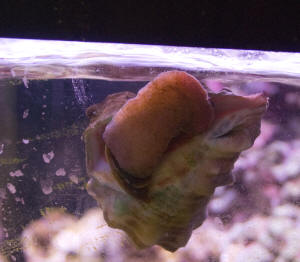 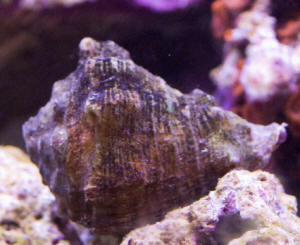 |
|
Snail Removed From Main Tank/Querior Did Not Reply To
Original Thread 9/30/09
Salty Dog,
<Victoria>
Thanks for the advice. I removed the suspect snail from my tank
and have taken a picture. Hope the picture comes attached to this
email.
<I've asked Lynn, our resident ID expert for her thoughts
on this snail.
Her reply is below.>
Hi James,
I just took a look at the little fellow...looks like another
predatory whelk of some sort (Superfamily: Buccinoidea). If she
wants to pursue an ID, ask her to send along a couple of good
close up photos (one showing the top surface of the snail, one
from underneath showing the opening and lip)
along with any other pertinent info (size, location of origin).
Otherwise, she can look through the thumbnails at the following
links:
http://www.gastropods.com/Taxon_pages/SuperFamily_BUCCINOIDEA.shtml
I'd start with this family: Buccinidae Pisaniinae (same as
the last query):
http://www.gastropods.com/Taxon_pages/TN_Family_BUCCINIDAE_PISANIINAE.shtml
As for the snails dying, I'd want to know what kind they
were, whether she had any hermits, whether all her snails were
dying or the ones she just recently bought and added, whether the
snail shells were left in a pile near the rockwork (possible
mantis shrimp), what her parameters are, etc, etc, blah, blah,
blah.
Hope that helps! Take care,
-Lynn
Thank you again for your time.
<You're welcome. James (Salty Dog)>
Victoria
|
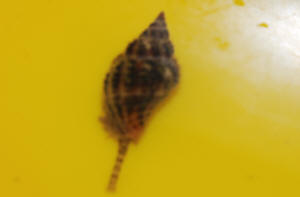 |
|
Snail ID: Whelk -- 9/26/09
Hi Lynn,
<Hi James>
Can you take a look at the query I answered. I'd like your
input on a snail ID.
<Sure thing>
The query is in the draft folder.
<Now I see the photo - thanks! It does indeed look like a
Buccinid/Whelk of some sort. If Candy would like to pursue an ID,
I'd be happy to help but would need a bit more information.
I'd need a good close-up showing the underneath portion
(including the opening and lip of the shell), as well as the size
and where the snail originated (doesn't have to be exact -
even a general idea would be helpful). Based on what I see right
now, it might be something in the family Buccinidae Pisaniinae.
Here's a link with photos for Candy to compare (just bear in
mind that color/pattern can vary to a surprising degree):
http://www.gastropods.com/Taxon_pages/TN_Family_BUCCINIDAE_PISANIINAE.shtml
>
Thank you much,
<Always a pleasure, James.>
James
<Take care, LynnZ>
|
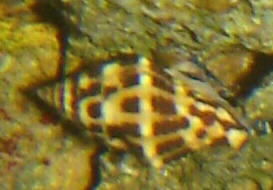 |
|
Re Can You Help Me Know Which He
Is?/Snail ID 9/28/09
<Hello Candy>
Thank you
<And Lynn>
for all the hard work with identifying the snail.
<You're welcome.>
I caught him and put him an a different tank where he will not be
able to eat my "good" snails. I have not been able to
find him again to take more pictures to help identify him more,
but I feel comfortable where he is at now.
Thank you for the snail information and I will be sure to learn
as much as I can. I truly appreciate everything.
<You're welcome. James (Salty Dog)
With Love,
Candy Albertson
|
|
Yellow Mobile Unknown Hitchhiker 9/10/09
Hello,
<Howsit?>
I have a very colorful hitchhiker that showed up about 3 months
ago. It was smaller than a pencil eraser at that time but over
the months it has grown to about the size of a quarter. It does
move around on the rocks,
not very fast but fast enough to make me look for him every
morning and evening. He is circular and mostly flat, except in
the center. Looks to be a mouth but I'm just guessing at
that. I took a photo this evening and as I was focusing, it spit
out a white speck from the "supposed" mouth.
Is this something beneficial or is it harmful to my reef
aquarium.
<More the former... I think this is the Limpet Lucapina aegis.
Bob Fenner>
Thank You
Beth
|
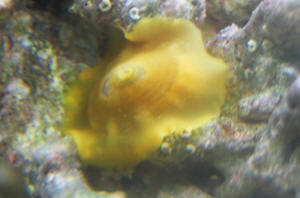  |
Re: Yellow Mobile Unknown Hitchhiker 9/10/09
Hello Again,
<Waking up now!>
After months of looking for the name of this hitchhiker, I
finally ask for assistance in identification and of course, in
the meantime, I keep looking for the answer. I used a different
search engine and different key words and I think that I found
the id. Is the answer Keyhole Limpet?
Thank You,
Beth
<A different Limpet (Thrumm!). BobF>
Re: Yellow Mobile Unknown Hitchhiker
9/10/09
Morning Bob,
<And you Beth>
Grab a cup of coffee and wake up.
<Am trying>
Just got your note, I am assuming the "different
limpet" means that I have the wrong species?,
<Mmm, yes... but such are the dangers of common
appellations>
I was going to go with Fleshy Limpet but the information I found
states that these are Keyhole Limpets as well.
<"You say tomatoe"... Megathura is the genus of our
(Calif.) Keyhole...>
However, the information also states that they are about the size
of a shield limpet or smaller. I have a shield limpet and my
yellow limpet is much bigger than the shield limpet.
Of course you could be stating that it is just a unusual looking
limpet.
In which case, I totally agree.
I am getting conflicting information about limpets and cannot
decide if they are beneficial or harmful. Do you have any
thoughts about the benefits or harm that they can cause to coral
and or live rock?
Thanks Again,
<... Please read on WWM re such Archaeogastropods....
BobF>
Re: Yellow Mobile Unknown Hitchhiker
9/10/09
Morning Bob,
<Still?>
Please ignore last post. I read your response to my second post
and did not see your answer to my original inquiry until a few
minutes ago. Yahoo sent it to my Spam folder.
Thanks
Beth
<Velkommen! B>
|
|
|

